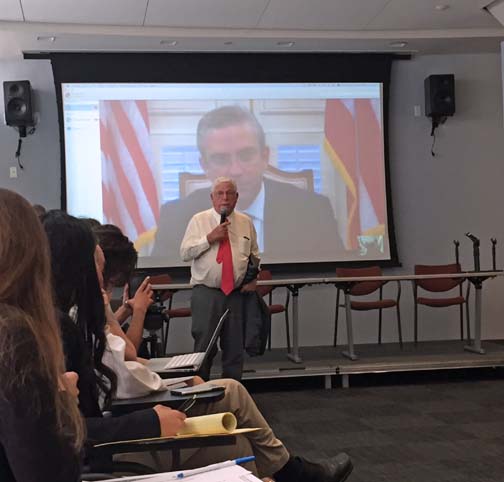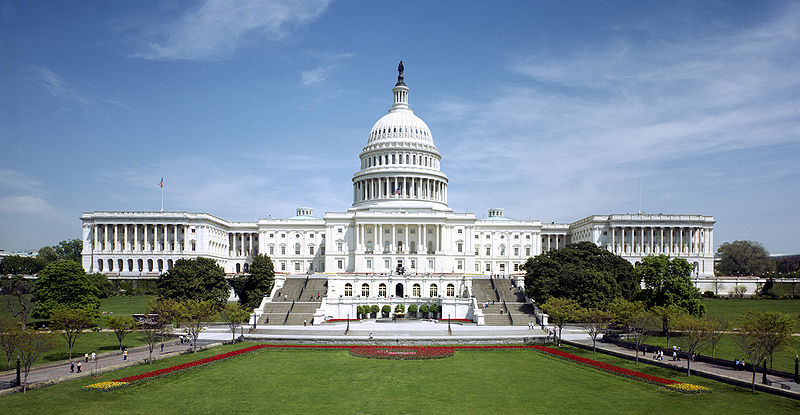Gov’t to have new fiscal plan ready for oversight board


Former New York Lieutenant Gov. Richard Ravitch introduces Gov. García-Padilla during Tuesday’s one-day seminar in New York.
NEW YORK — Puerto Rico Gov. Alejandro García-Padilla confirmed Tuesday that his administration will have a new fiscal plan ready shortly after the federal fiscal oversight board is “appointed and operational.”
The seven-member board, which is a component of the Puerto Rico Oversight, Management and Economic Stability Act (PROMESA), should be appointed by Sept. 15, when the García-Padilla administration expects to “hit the ground running in complying with PROMESA’s requirements,” he said speaking to reporters and experts who took part in a special one-day seminar entitled “What’s next for Puerto Rico?” hosted by the Ravitch Fiscal Reporting Program at the CUNY Graduate School of Journalism in Manhattan.
“My administration is committed to proactively interact with the Board as the best strategy to ensure that its tenure is short and its potential for undemocratic intrusion is checked, and to assure the people of Puerto Rico that their work is transparent,” he said.
One of PROMESA’s most important requirements is the development of a fiscal plan that contains various key elements that seek to ensure fiscal and economic sustainability. In particular, the fiscal plan must: Provide long-term expense and revenue projections based on independent forecasts; Ensure the funding of essential services and public pensions; Provide for the elimination of structural deficits ; and provide for a debt burden that is sustainable, he said.
During the seminar, Jim Millstein, head of the restructuring consulting firm that has been working with the Puerto Rico government in talks with creditors to rework the current $68 billion in public debt, said the goal is to bring down the debt load so that it represents a 15 percent revenue-to-debt service revenue. It currently stands at 36 percent, significantly higher than U.S. jurisdictions with the highest debt loads, including Hawaii.
To comply with PROMESA’s requirement that the Commonwealth submits budgets to the Board to ensure consistency with the agreed-upon plan, García-Padilla said he has Office of Management and Budget Executive Director Luis Crus “to develop the internal process necessary to ensure the budgetary development and approval process is handled seamlessly and in coordination with the Board.”
“Additionally, we are taking steps so that the fiscal impact of any proposed legislation is analyzed and presented to the Board,” the governor said.
He has also ordered OMB, the Treasury Department and the Fiscal Agency and Financial Advisory Authority to create a task for to comply with the PROMESA requirement for the government to submit to the Board an estimate of any law’s impact on revenues and expenditures, as well as an analysis of the consistency of the law with the Fiscal Plan.
Treasury must also provide the Board with a tax expenditure budget report that documents all of the Commonwealth’s existing tax relief agreements.
“Historically, tax incentives have been granted indiscriminately and without proper cost-benefit analyses. This has led to a patchwork system that encourages tax evasion and erodes the tax base,” García-Padilla said, adding the report should be in the Board’s hands within six months of its establishment.
Meanwhile, the governor said he has directed his fiscal team to develop monthly reporting packages based on dashboard and key performance indicators with respect to revenues, expenditure, cash flow and economic activity, to meet PROMESA’s requirements on regular reporting to ensure compliance with fiscal plans and budgets.
“My administration has materially enhanced the scope of fiscal reporting on the island and is committed to the investments in information technology necessary to ensure greater transparency and frequency of disclosure. I have thus ordered that the costs of required investments in information technology infrastructure are included as part of my fiscal plan,” he said.
García-Padilla also said he has instructed Treasury Secretary Juan Zaragoza to “do anything in our power to deliver and provide the information needed for the audited 2015 financial statements with the goal of publishing them before Jan. 1, 2017.”
“Such delivery would put the government back on track to publish audited financial statements on a timely basis,” he said.
Looking ahead, the governor said he has also instructed his fiscal team and external advisors to continue talks with creditors to achieve consensual agreements on restructuring of the debt.
“In deciding what can be a good, acceptable deal for Puerto Rico, with the help of federal agencies, we will be considering the effects of our continued tax base erosion due to severe outmigration by benchmarking public services to those enjoyed by Puerto Ricans in the mainland so that we can make the investments necessary to improve our residents’ quality of life and reverse demographic trends,” he said. “But make no mistake. We will not cut a bad deal for the people of Puerto Rico.”











